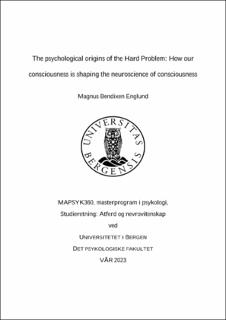| dc.description.abstract | The field of consciousness studies contains a substantial number of coexisting neurocognitive theories of consciousness. These theories vary in their initial definitions of what consciousness is, biasing scientific methods and measurement of the phenomenon, resulting in a divided science. Definitions of consciousness tend to vary along two lines: Either consciousness is seemingly reducible to physical and functional processes, indicating what is called access consciousness; or it constitutes a seemingly irreducible experience, indicating phenomenal consciousness. These two types of definitions correspond to two opposing camps on what is referred to as the hard problem of consciousness, also called the explanatory gap. While much effort has been spent by each camp either criticizing or defending the hard problem, little work has been done to explain why the two camps vary along these lines. In other words, there is a gap between our positions on the explanatory gap, which I label the “meta-gap”. In the current paper I contribute to bridging the meta-gap by attempting to explain and reconcile this basic disagreement in the field. By performing targeted literature searches, I answer seven research questions which serve as stepping stones to take us from problematic features of the field, to individual differences between researchers as a reason for these problems. My analysis of these individual differences results in two hypothesized psychological constructs: Internal and external explanatory focus. I conclude by indicating that solving the meta-gap involves becoming aware of our individual dispositions towards choosing different explanatory targets for consciousness. | |
